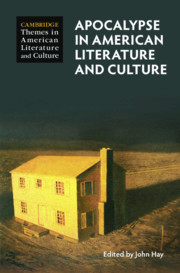Book contents
- Apocalypse in American Literature and Culture
- Cambridge Themes in American Literature and Culture
- Apocalypse in American Literature and Culture
- Copyright page
- Contents
- Figures
- Contributors
- Introduction The United States of Apocalypse
- Part I America as Apocalypse
- Part II American Apocalypse in (and out of) History
- Part III Varieties of Apocalyptic Experience
- Chapter 17 New History for a New Earth
- Chapter 18 W. E. B. Du Bois’s Apocalyptic Ambivalence
- Chapter 19 The Empty Cities of Urban Apocalypse
- Chapter 20 The Planetary Futures of Eco-Apocalypse
- Chapter 21 The Last Laughs of Doomsday Humor
- Chapter 22 The Catastrophic Endgames of Young Adult Literature
- Chapter 23 Apocalyptic Trauma and the Politics of Mourning a World
- Chapter 24 Posthuman Postapocalypse
- Further Reading
- Index
Chapter 23 - Apocalyptic Trauma and the Politics of Mourning a World
from Part III - Varieties of Apocalyptic Experience
Published online by Cambridge University Press: 03 December 2020
- Apocalypse in American Literature and Culture
- Cambridge Themes in American Literature and Culture
- Apocalypse in American Literature and Culture
- Copyright page
- Contents
- Figures
- Contributors
- Introduction The United States of Apocalypse
- Part I America as Apocalypse
- Part II American Apocalypse in (and out of) History
- Part III Varieties of Apocalyptic Experience
- Chapter 17 New History for a New Earth
- Chapter 18 W. E. B. Du Bois’s Apocalyptic Ambivalence
- Chapter 19 The Empty Cities of Urban Apocalypse
- Chapter 20 The Planetary Futures of Eco-Apocalypse
- Chapter 21 The Last Laughs of Doomsday Humor
- Chapter 22 The Catastrophic Endgames of Young Adult Literature
- Chapter 23 Apocalyptic Trauma and the Politics of Mourning a World
- Chapter 24 Posthuman Postapocalypse
- Further Reading
- Index
Summary
Because of its inherent multidisciplinarity and conceptual flexibility, trauma theory has, from the start, been subject to ongoing revisions and redefinitions. This essay expands the notion of trauma as resulting from unassimilable, life-threatening, past events by conceptualizing trauma as resulting from the envisaged imminent annihilation of the known world. This apocalyptic trauma is embedded in American literature and closely tied to the politics of mourning dramatized in narratives of loss and melancholia but also in narratives of political activism and regeneration. This essay discusses apocalyptic expressions related to the trauma of the loss of the culture of the Old South in William Faulkner’s work, to the trauma of dispossession and cultural erasure in Chicano/a literature, and to the trauma of envisaged global annihilation in American eco-poetry.
- Type
- Chapter
- Information
- Apocalypse in American Literature and Culture , pp. 304 - 316Publisher: Cambridge University PressPrint publication year: 2020

